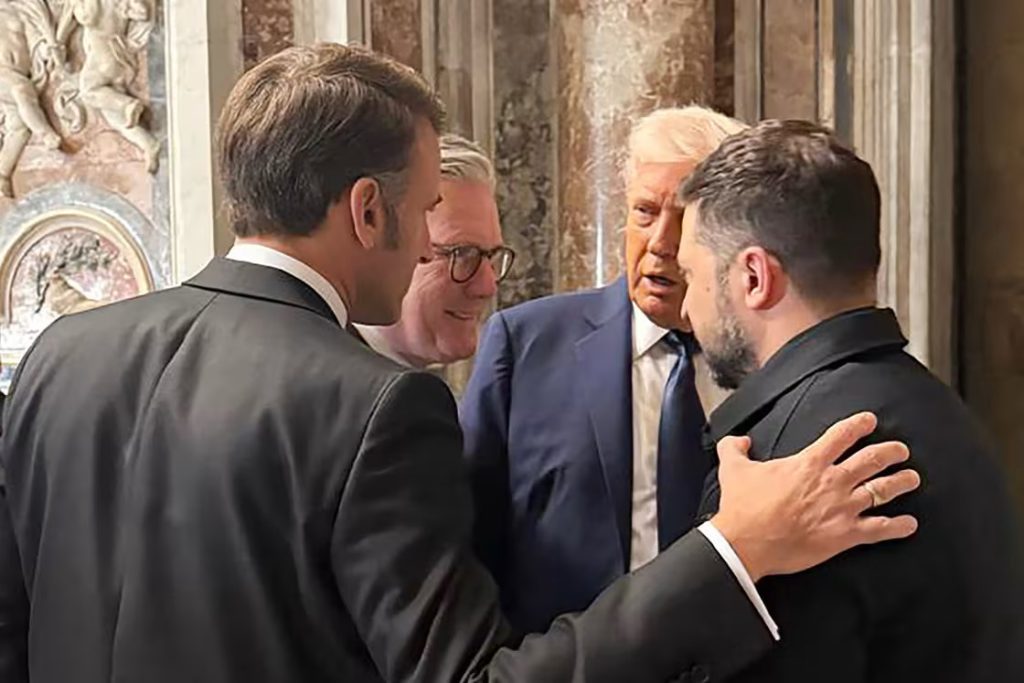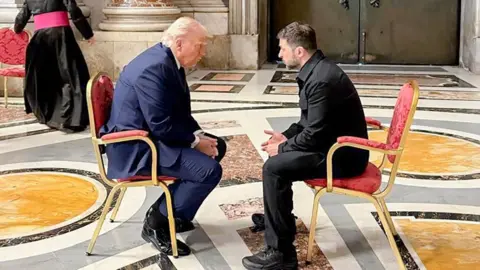Putin Declares Ceasefire as Trump Suggests Zelenskyy May Cede Crimea
Russian President Vladimir Putin declared a temporary ceasefire in Ukraine on Monday, just hours after former U.S. President Donald Trump said he believed Ukrainian President Volodymyr Zelenskyy might be willing to cede Crimea as part of a broader peace agreement.
According to a Kremlin statement, the ceasefire will begin at midnight local time on May 8 and continue until midnight on May 11. The pause in hostilities is timed to coincide with the 80th anniversary of Victory Day, a major Russian holiday commemorating the defeat of Nazi Germany.
The Kremlin added that all Russian military operations would be halted during this window and called on Ukrainian forces to do the same. It warned that any violations of the ceasefire would prompt a response.
The announcement follows Trump’s comments suggesting a potential shift in Ukraine’s position on Crimea, the peninsula that Russia annexed from Ukraine in 2014. When asked whether Zelenskyy was prepared to cede Crimea, Trump responded, “I think so,” implying that territorial concessions could be on the table to secure a long-term truce.
With diplomatic activity intensifying, the ceasefire marks what could be a pivotal moment in efforts to reduce tensions. Over the weekend, both the Trump camp and Ukrainian officials made optimistic remarks about the possibility of progress. On Monday, a spokesperson for Putin said the Kremlin was open to peace talks with both Kyiv and Washington.

Lavrov Outlines Russia’s Conditions for Peace
Russian Foreign Minister Sergey Lavrov on Monday outlined the Kremlin’s terms for any potential peace agreement, stating that international recognition of Crimea and four other Ukrainian regions as part of Russia is “imperative.”
Lavrov emphasized that such recognition must be legally binding and permanent. He also insisted that a deal would require the full demilitarization of Ukraine, the lifting of Western sanctions on Russia, and the return of Russian assets that have been frozen abroad.
Trump, Zelenskyy Meet in Vatican as Ceasefire Hopes Rise Amid Escalation and Russian Demands
Former President Donald Trump met with Ukrainian President Volodymyr Zelenskyy on Saturday in Vatican City, on the sidelines of Pope Francis’ funeral. Speaking to reporters aboard Air Force One the following day, Trump expressed optimism about a possible ceasefire deal, urging Russian President Vladimir Putin to “stop shooting, sit down and sign a deal.”
“We have the confines of a deal, I believe, and I want him to sign it and be done with it and just go back to life,” Trump said.
Zelenskyy, when asked about the meeting, called it “really productive” but did not offer further details. He noted similar meetings with British Prime Minister Keir Starmer and French President Emmanuel Macron, adding that he hoped to continue such talks in pursuit of peace for Ukraine.
Trump remarked that Zelenskyy seemed “calmer” during the meeting—likely referencing their tense exchange during the Ukrainian leader’s White House visit in February.
Though Zelenskyy has repeatedly insisted that Ukraine will not cede Crimea, he made no immediate response to Trump’s recent suggestion that such a concession might be possible. However, pressure on him is growing. On Friday, Kyiv Mayor Vitali Klitschko acknowledged that Ukraine may eventually need to give up territory to secure peace.
Trump, often criticized for a softer approach to the Kremlin, struck a more forceful tone over the weekend, echoing his earlier disappointment about continued Russian missile strikes. His remarks signal a potential shift in his stance on the war.
The Kremlin responded Monday, with spokesperson Dmitry Peskov acknowledging Trump’s comments but stating that Russia’s “special operation continues.” He reiterated Moscow’s readiness to negotiate with both Washington and Kyiv.
Despite talk of diplomacy, fighting on the ground has not ceased. Ukrainian officials reported overnight shelling in the Dnipropetrovsk, Sumy, and Kherson regions. In a late-night address, Zelenskyy accused Russia of contradicting its own peace rhetoric. “The Russians talk a lot about their alleged readiness to accept American proposals, but so far, there have been no signs of the Russian army preparing for real silence,” he said.
In a major development, North Korea confirmed for the first time that its troops are fighting alongside Russian forces in Ukraine. The Kremlin claimed on Monday that, with North Korean support, it had retaken the strategic city of Kursk—a claim Ukraine denied, insisting that defensive operations were ongoing in the area.
If Kursk is indeed under Russian control, it would eliminate a major Ukrainian bargaining chip in ongoing ceasefire negotiations.
Appearing on NBC’s Meet the Press, Secretary of State Marco Rubio said he was “cautiously optimistic” about a deal. “We’re close,” he said, “but we’re not close enough.”

